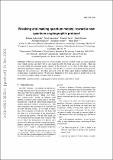Breaking and making quantum money: toward a new quantum cryptographic protocol
Author(s)
Lutomirski, Andrew Michael; Gosset, David Nicholas; Hassidim, Avinatan; Farhi, Edward; Shor, Peter W.; Kelner, Jonathan Adam; Aaronson, Scott; ... Show more Show less
Download0912.3825v1.pdf (245.5Kb)
OPEN_ACCESS_POLICY
Open Access Policy
Creative Commons Attribution-Noncommercial-Share Alike
Terms of use
Metadata
Show full item recordAbstract
Public-key quantum money is a cryptographic protocol in which a bank can create quantum states which anyone can verify but no one except possibly the bank can clone or forge. There are no secure public-key quantum money schemes in the literature; as we show in this paper, the only previously published scheme is insecure. We introduce a category of quantum money protocols which we call collision-free. For these protocols, even the bank cannot prepare multiple identical looking pieces of quantum money. We present a blueprint for how such a protocol might work as well as a concrete example which we believe may be insecure.
Description
http://conference.itcs.tsinghua.edu.cn/ICS2010/
Date issued
2010-01Department
Massachusetts Institute of Technology. Computer Science and Artificial Intelligence Laboratory; Massachusetts Institute of Technology. Department of Electrical Engineering and Computer Science; Massachusetts Institute of Technology. Department of Mathematics; Massachusetts Institute of Technology. Department of Physics; Massachusetts Institute of Technology. Research Laboratory of ElectronicsJournal
First Symposium on Innovations in Computer Science, ICS 2010
Publisher
Institute for Computer Science
Citation
Lutomirski, Andrew, et al. "Breaking and Making Quantum Money: Toward a New Quantum Cryptographic Protocol." Proceedings of Innovations in Computer Science (ICS), 2010.
Version: Original manuscript
Other identifiers
MIT-CTP-4091
Keywords
quantum money, cryptography, random matrices, markov chains